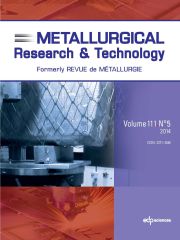No CrossRef data available.
Article contents
Multivariable feed-forward command for batch processes. Application to the hot isostatic sintering of alumina
Published online by Cambridge University Press: 22 January 2003
Abstract
Discontinuous elaboration or transformation processes treat separate batches of raw materials. The properties of the raw materials may differ from one batch to the other, thus altering the kinetics of the transformation process. When these changes are significant and they are not taken into account by the transformation process, the final product may be unsatisfactory. It is shown that a feedback command is usually not able to restore the requested quality of the final product. A process model that can be re-identified during the operation makes it possible to define the adjustments to the process parameters that will yield a final product with satisfactory properties. In this paper, a feed-forward command based on a linear approximation of the process model is proposed in order to predict the necessary adjustments. This method is much simpler and requires less computing time than the usual non-linear optimization methods, in particular for multivariable processes. As an example, this technique is applied to control a multivariable elaboration process of materials : the hot isostatic sintering of alumina powder.
- Type
- Research Article
- Information
- Metallurgical Research & Technology , Volume 99 , Issue 12: Présent et futur des matériaux frittés , December 2002 , pp. 1081 - 1095
- Copyright
- © La Revue de Métallurgie, 2002


